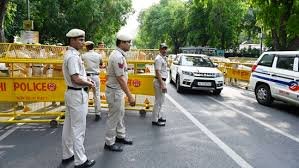
Seelampur, Jamia Nagar (Delhi): 22nd May,2025
In a major breakthrough for India’s national security, the Delhi Police Special Cell has arrested two men accused of being agents of Pakistan’s intelligence agency, ISI (Inter-Services Intelligence). This was part of a high-level secret operation that also exposed a wider sleeper cell network operating silently in Delhi and nearby regions.
The arrested individuals were allegedly involved in spying activities and had been gathering sensitive military and political information, which they were sending to their Pakistani handlers. According to official sources, they were part of a coordinated espionage plan targeting defense establishments and government systems in India.
Identities of the Accused
The two men arrested have been identified as Mohammad Saeed (32) and Zubair Khan (29). Saeed is a resident of Bahraich district in Uttar Pradesh, while Zubair hails from Bareilly. Both had been living in Delhi under fake identities, using forged documents such as Aadhar and PAN cards to conceal their real backgrounds. They had blended into the local population, acting like regular citizens while continuing their spy work.
The Start of the Operation
This secret mission began when the Intelligence Bureau (IB) and the Delhi Police Special Cell received alerts about suspicious communications happening from certain parts of Delhi. The agencies started cyber surveillance, including phone tapping, tracking digital footprints, and monitoring financial transactions. After two months of careful observation, the agencies gathered enough proof of their ISI links and launched simultaneous raids in Seelampur and Jamia Nagar, two high-density neighborhoods in Delhi.
What Is a Sleeper Cell?
A sleeper cell is a hidden group of trained individuals who live like normal citizens and stay inactive until they receive instructions from their foreign handlers. Once activated, they carry out tasks such as spying, recruitment, sabotage, or even terror attacks. During the interrogation, both men revealed that they were part of such a sleeper cell network controlled directly by the ISI.
The investigation indicates that their network extended across multiple Indian states, including Delhi, Uttar Pradesh, and Maharashtra, and had the potential to become active on command.
Items Seized During the Raid
Police recovered a range of sensitive and suspicious materials from the hideouts of the accused. This included:
- Mobile phones with encrypted communication apps
- Laptops containing defense maps and military information
- Fake identity documents
- Foreign SIM cards
- Handwritten notes in code language
- Details of hawala transactions connected to Gulf countries
These materials were sent to the forensic lab for detailed analysis, and the digital data is currently being decrypted to uncover more contacts and instructions.
Confirmed Links to ISI
It has been confirmed that both men were in direct contact with ISI handlers in Pakistan. The suspects were trained to gather classified information about India’s military and government systems and to send it across the border using secure digital channels like VPNs and encrypted chats. The ISI handlers provided detailed instructions, code words, and even payment methods through hawala networks.
This case again proves that ISI continues to target India using recruited locals and advanced cyber tools to remain undetected for long periods.
Political Response
Following the arrests, Union Home Minister Amit Shah praised the Delhi Police’s success and tweeted:
“Salute to our brave officers for their hard work. This is a big win for India’s internal security.”
Political leaders from various parties emphasized the need for stronger surveillance systems, public cooperation, and centralized intelligence sharing to stop such covert spy operations in the future.
Central Government’s Reaction
According to sources, National Security Advisor Ajit Doval was immediately briefed on the matter. There is coordination between central agencies, including the National Investigation Agency (NIA), which is likely to take over the case under the Unlawful Activities (Prevention) Act (UAPA).
Security has already been tightened around critical defense and government infrastructure, and cyber surveillance has been increased to detect similar threats.
Public Awareness and Safety Measures
The Delhi Police is also planning to launch a public awareness campaign to educate citizens about how to recognize suspicious activity. The campaign will highlight the importance of:
- Verifying tenant identities
- Reporting individuals with multiple SIM cards or phones
- Watching for unusual foreign contacts
- Reporting any suspicious behavior via the Delhi Police mobile app
High-alert zones for the campaign will include Okhla, Seelampur, Old Delhi, Noida, and Ghaziabad.
Gulf Connection and Funding
Police sources say that the ISI sleeper cell network was also supported by operatives in UAE, Saudi Arabia, and Qatar. These countries were allegedly used to route funds to agents through hawala transactions and illegal banking channels. Indian authorities have informed Interpol and other foreign agencies to trace international links and arrest any associates abroad.
History of ISI Espionage in India
This is not the first time that ISI has been exposed for spying in India. In recent years:
- A journalist posing as a defense reporter was arrested in Rajasthan in 2023 for passing army details to ISI.
- An army clerk in Punjab was caught in 2022 for leaking classified documents.
- In 2020, two operatives were arrested in Kolkata for trying to sabotage military rail movement.
These repeated incidents show that India remains under constant threat from foreign intelligence services.
This arrest operation by the Delhi Police is a significant success for Indian law enforcement. It highlights the importance of modern intelligence, cooperation between agencies, and the role of ordinary citizens in keeping the nation safe.
India’s enemies no longer attack only from the borders—they operate quietly within cities, blending in until they are activated. Only vigilance, awareness, and quick response can prevent such threats from harming national security.































